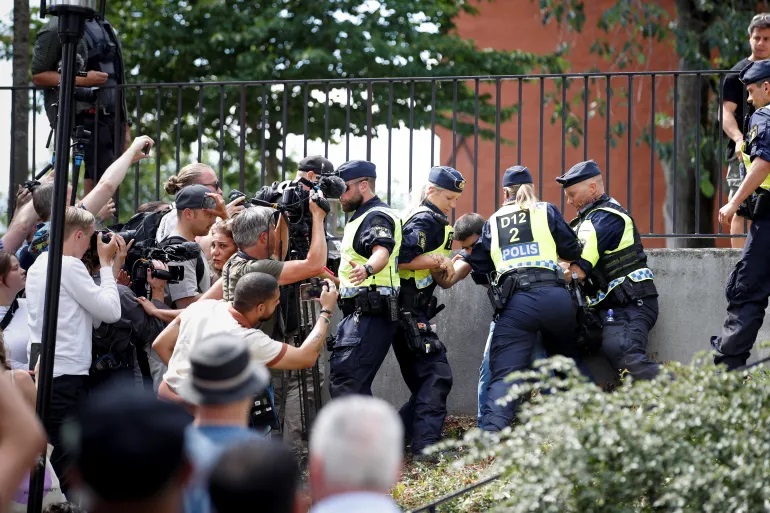On the first day of the Muslim religious holiday Eid al-Adha (Feast of Sacrifice), in memory of the biblical story of Abraham’s attempted sacrifice of his son, it happened again in Sweden. The holy Quran was burned by an Iraqi refugee with the permission of the local police authority. This time it was outside the largest mosque in Stockholm last Wednesday (28 June).
The hateful burnings of the Quran in Sweden started in 2020 in the southern Swedish city Malmö by a far-right Danish politician with a record of Quran burnings and incitement against Muslim migrants. He came back during the Easter holiday in 2022 when he wreaked havoc in the central and southern parts of the country during a tour of burnings.
After new Quran burnings this year, this time to antagonize Turkey and prevent Sweden’s application to NATO, the Swedish police tried to limit or ban the burning of the Quran. The police argued that it should be banned because it incited to hatred against minority groups and threatened public security and order.
The European Commission has condemned previous Quran burnings. But Swedish courts ruled that the burning was legal according to current Swedish legislation on freedom of expression and the right to assembly. A judge even claimed that the burning was not directed against any minority group but only against a book.
Asked about the Quran burning at the press conference following the European Council summit in Brussels on Friday (30 June), Swedish Prime Minister Ulf Kristersson fell short of condemning it and replied that he did not intend to grade it. He repeated that not everything that is legal is appropriate and called on people to come to their senses and treat each other with dignity.
The intentional burning of the Quran in public is a hateful act that hurts and stirs up the feelings of millions of Muslims living in Europe and the rest of the world. It is also a blow against the integration of the majority of Muslim that distance themselves from extremism and violence.
Such outrageous actions are unacceptable no matter what holy books they are directed against – the Quran in this case or the Bible, which is a holy book for Jews, Christians and Muslims alike. Insulting believers’ faith and values by burning the books they consider as sacred does not contribute to any debate and cannot be considered to be within the scope of freedom of expression.
Freedom of religion implies that every person has the right to choose his faith of his own free will and believe in the holy book which is the basis of that religion. It cannot be imposed by forced conversion and the threat of violence as happened in the past. Insults and incitement only lead to hatred, hostility and conflict.
The Quran calls for tolerance of other religions. In a famous verse (108), Muslims are told “not to insult those whom they worship besides Allah lest they become disrespectful towards Allah through injustice and ignorance”. The explanation given is that insulting other religions, even of those worshipping idols, could result in insults against Allah and his Prophet.
The lessons of history are well known. During the Middle Ages, books were burnt by the Church. Nazi Germany burned books that the regime did not like. The words of the German-Jewish poet Heinrich Heine springs to mind: “Where they have burned books, they will end in burning human beings.” It did end in WWII and the Holocaust.
After the war, Europe rose from the ashes and swore never again. The European Union was established as a peace project based on democracy, the rule of law and fundamental rights. All forms of racism, xenophobia and related intolerance are incompatible with the values on which the EU is founded.
But new far-right parties, some of them with neo-Nazi roots, have started to spread hate speech and incite to violence against Muslims and other minority groups. Sweden is perhaps the only EU member state where the public burning of the Quran is allowed because of a far-fetched interpretation of freedom of expression.
Anti-Muslim acts such as the burning of the Quran also play into the hands of authoritarian rulers and dictators who use religion as a political tool. It was not a coincidence that both Erdogan and Putin were among the first to react against the Quran burning in Sweden. Unless Sweden will legislate against Quran burning, Turkey is likely to refuse to approve its NATO application.
Mutual tolerance and respect are key for religious communities to co-exist peacefully. An open and respectful dialogue is useful and brings understanding and change in society. But insulting other's beliefs, worships, and religious customs is not dialogue. The burning of a book which is sacred to its believers is a disgraceful and violent act and the opposite of dialogue.


